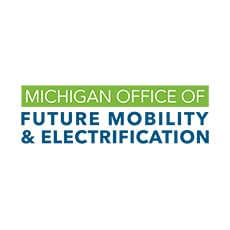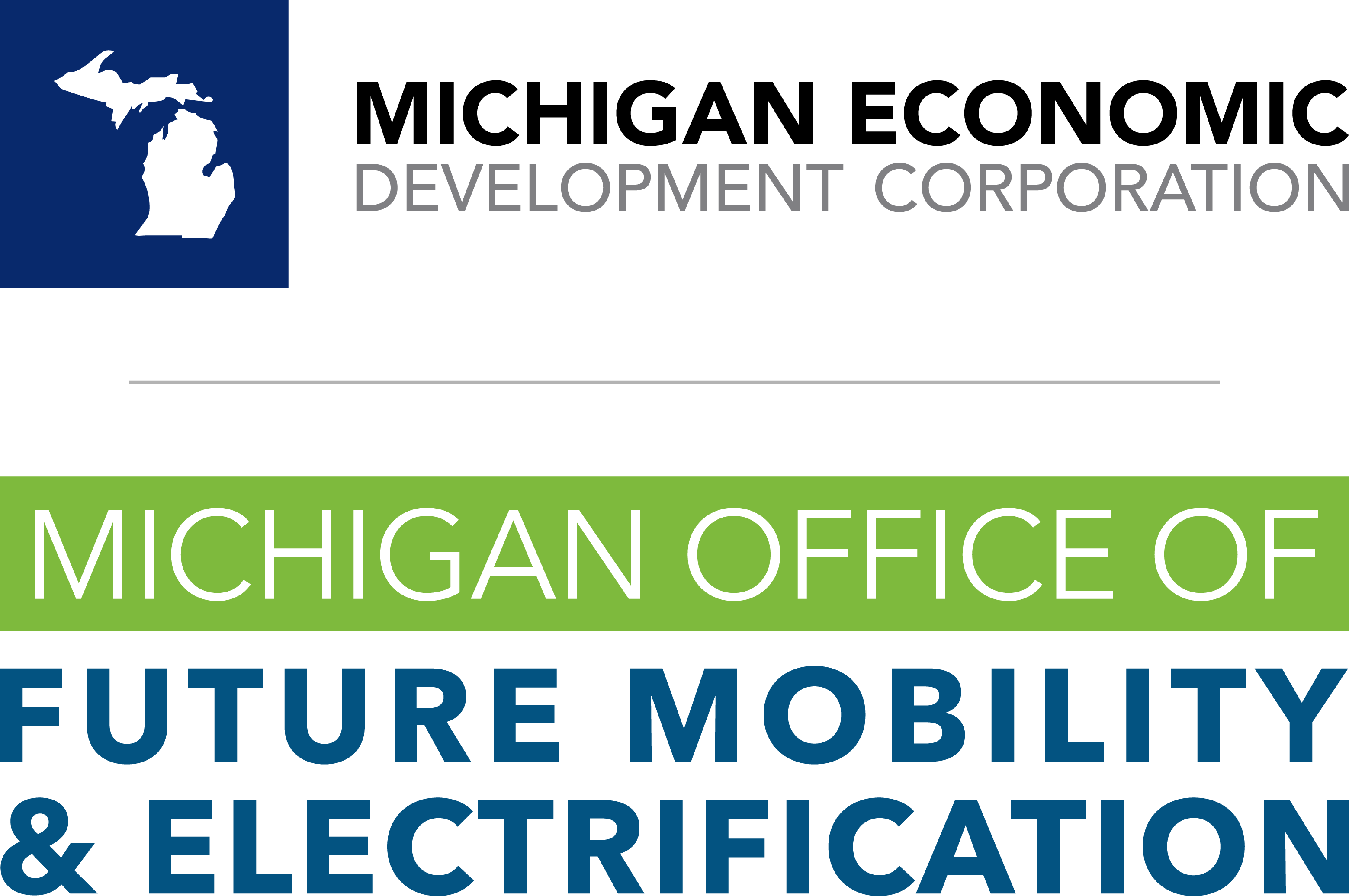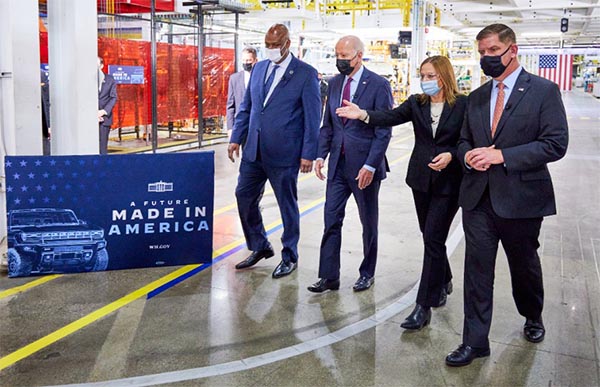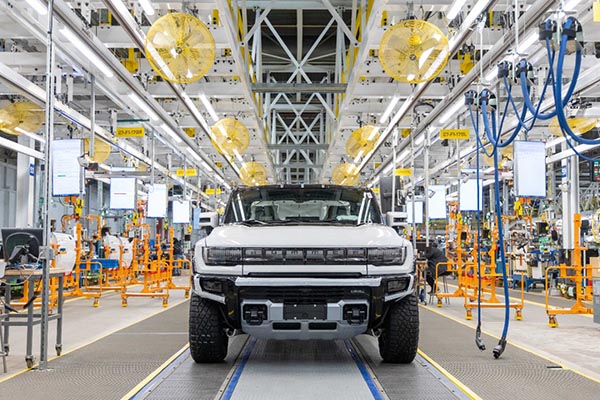 Governor Whitmer Announces Grants to Bolster Mobility Ecosystems and Increase Accessibility in the State
Governor Whitmer Announces Grants to Bolster Mobility Ecosystems and Increase Accessibility in the State
Governor Gretchen Whitmer announced Wednesday the second round of Michigan Mobility Funding Platform grants, which will support initiatives that underscore Michigan’s commitment to providing more accessible, equitable, and sustainable mobility options. Seven mobility companies – AbleLink Smart Living Technologies, Fermata Energy, iSmartWays, Lazarillo, Mitsubishi Electric Automotive America, Michigan State University, and Stantec – received more than $618,000 in funding to deploy pilot mobility projects in Michigan that will help augment electric vehicle (EV) adoption as well as address various mobility barriers throughout the state.
“These grants and the projects they fund are helping us put Michiganders first, growing our economy, and positioning Michigan as a leader in the development and implementation of safe, sustainable mobility solutions,” said Governor Whitmer. “Through these community-led initiatives and technologies, our residents will be empowered to take control of their transportation options with more accessible and affordable solutions that will lead to a greater quality of life here in Michigan.”
More than $618,000 in grant funding awarded in second round of Michigan Mobility Funding Platform helping to facilitate programs in Southeast Michigan, Washtenaw, and Ingham Counties
LANSING, Mich. – Governor Gretchen Whitmer announced today the second round of Michigan Mobility Funding Platform grants, which will support initiatives that underscore Michigan’s commitment to providing more accessible, equitable, and sustainable mobility options. Seven mobility companies – AbleLink Smart Living Technologies, Fermata Energy, iSmartWays, Lazarillo, Mitsubishi Electric Automotive America, Michigan State University, and Stantec – received more than $618,000 in funding to deploy pilot mobility projects in Michigan that will help augment electric vehicle (EV) adoption as well as address various mobility barriers throughout the state.
“These grants and the projects they fund are helping us put Michiganders first, growing our economy and positioning Michigan as a leader in the development and implementation of safe, sustainable mobility solutions,” said Governor Whitmer. “Through these community-led initiatives and technologies, our residents will be empowered to take control of their transportation options with more accessible and affordable solutions that will lead to a greater quality of life here in Michigan.”
Launched by the Office of Future Mobility and Electrification, in partnership with the Michigan Economic Development Corporation and Michigan Department of Transportation, the Michigan Mobility Funding Platform provides grants to mobility and electrification organizations looking to deploy solutions in the state of Michigan.
“Michigan is leading the charge in mobility innovation, developing solutions that not only address transportation challenges here in Michigan, but help solve universal issues by testing, developing and deploying technologies with meaningful real-world applications,” said Trevor Pawl, Chief Mobility Officer with the Office of Future Mobility and Electrification. “We are pleased to further support mobility innovators and their initiatives through these grants, as they represent both Michigan’s commitment to collaboration as well as its focus on supporting and next-generation startups and technologies.”
Today’s announcement of the second round of grants through the Michigan Mobility Funding Platform follows the news of the first round grant winners in September 2021, when $440,000 was awarded to five projects. With these seven new grants, a total of $1,058,690 has been awarded through the program in 2021.
The Michigan Mobility Funding Platform grants focus on catalyzing and scaling mobility solutions that improve environmental sustainability by encouraging electric vehicle (EV) adoption and the buildout of EV charging infrastructure, alleviate mobility barriers and increase access to affordable and reliable transportation options and modernize existing transportation systems. OFME has partnered with NextEnergy and Newlab to help review and administer grant applications, which are accepted on a rolling basis at michiganbusiness.org/mobility-funding.
Michigan Mobility Funding Platform Grant recipients are as follows:
AbleLink Smart Living Technologies ($100,000 – Wayne, Oakland. Macomb, and Washtenaw Counties)
In collaboration with W.A.V.E (Western-Washtenaw Area Value Express), Programs to Educate All Cyclists (PEAC), and Suburban Mobility Authority for Regional Transportation (SMART), AbleLink Smart Living Technologies will help make independent travel more accessible to individuals with cognitive disabilities or those experiencing cognitive decline by implementing its WayFinder Ecosystem into the transit systems serving Wayne, Oakland, Macomb and Washtenaw counties. With the Ecosystem in place, users who typically have challenges learning fixed transit routes will be able to safely access and learn routes and build confidence in their independent transportation skills.
“For a person with cognitive disabilities, being able to ride the bus by yourself offers the opportunity to get a job, visit friends and family, and the freedom to go where you want – when you want,” said Daniel K. Davies, Founder, and President, AbleLink Smart Living Technologies, LLC. “We are excited to begin this effort to deploy the WayFinder travel support system for residents of Southeast Michigan. We appreciate the interest of Michigan’s Office of Future Mobility and Electrification in exploring this innovative technology to help overcome barriers to independent travel.”
Fermata Energy ($93,690 - Detroit)
In partnership with Sway Mobility and Bedrock, Fermata Energy will utilize a Nissan LEAF electric vehicle (EV) to provide mobility and building load management at a Bedrock development site in Detroit’s Corktown neighborhood. Specifically, Fermata Energy’s bidirectional EV charger and proprietary energy management software will help manage energy costs with Sway Mobility’s equitably accessible carshare-as-a-service. The project aims to provide low-cost, clean mobility to Corktown residents who would not otherwise have access to EVs, while providing electricity cost savings for businesses through vehicle-to-building (V2B) charge management.
“Michigan is at the core of the electric vehicle revolution,” said David Slutzky, founder, and CEO, Fermata Energy. “While everyone is focused on range, Fermata Energy is focused on how parked EVs can power buildings and the grid through our vehicle-to-everything (V2X) technology, and how we can help make EVs more affordable. Our company is grateful to have this opportunity to work with the State of Michigan and be a part of the Michigan Mobility Platform."
iSmartWays ($100,000 - Detroit)
iSmartWays is partnering with The Connected and Autonomous Driving (CAR) Lab at Wayne State University, WSP USA, and Qualcomm to deploy connected intersections on the University’s campus in Detroit’s Midtown area, as well as connectivity technology on the University’s fleet vehicles. The goal of the project is to improve safety, reduce congestion, optimize traffic flow and improve fleet vehicle arrival times.
“We are very excited to deploy connected intersections in Detroit Midtown,” said Walter Espinoza, vice president of operations, iSmartWays. “Together with our partners, we will also deploy our C-V2X technology on university fleet vehicles and build a real-world living lab environment where partners and other ecosystem players can research and validate future Cooperative Intelligent Transportation Systems solutions. We are very appreciative of the financial support provided by the Office of Future Mobility and Electrification, Michigan Economic Development Corporation, and Michigan Department of Transportation under the Michigan Mobility Funding Platform.”
Lazarillo ($75,000 - Detroit)
Lazarillo will work to improve mobility and accessibility for people with visual disabilities living in key areas and neighborhoods within Detroit, such as Corktown, Midtown, Mexicantown, and Downtown. In partnership with Newlab, Ford, Eyelearn, and public transit groups including the Detroit Department of Transportation (DDOT), Suburban Mobility Authority for Regional Transportation (SMART), Qline, and the People Mover, Lazarillo will enhance geolocation services for public transportation systems in Detroit as well as map street intersections, sidewalks and businesses in the area to help users with visual impairments reach their destinations with more precision and navigate city life more safely.
"The team at Lazarillo is so excited and grateful for the opportunity provided by this grant,” said René Espinoza, founder, and CEO, Lazarillo. “It’s going to help us reach and support more people with disabilities in Michigan, and help small businesses improve their accessibility in-person and online."
Mitsubishi Electric Automotive America ($150,000)
Mitsubishi Electric Automotive America, in collaboration with Meijer, will test and deploy autonomous vehicle infrastructure that will enable Meijer distribution centers to automate the movement of their trailers around distribution center lots. The program helps address ongoing driver and labor shortages, and could ultimately be applied at other distribution centers, ports, and public infrastructures.
“Innovation has always been a driving force in the way we do business at Meijer,” said Mike Graham, senior vice president of Supply Chain and Manufacturing, Meijer. “This pilot program with Mitsubishi Electric Automotive America has the potential to provide more efficiency in our operations, while also offering a look into the future of autonomous vehicle technology.”
“The support of the MEDC has been invaluable throughout this process,” said Mark Rakoski, vice president, Mitsubishi Electric Automotive America. “The selection for this grant and collaboration with Meijer really accelerated the project and allowed us to deploy our technology right here in Michigan.”
Michigan State University ($100,000 – Ingham County)
Michigan State University, together with Qnergy Co., Bollinger Motors, and Ingham County, will develop a mobile waste-to-electricity solution to allow small- and medium-scale farm operations to convert organic wastes into electricity for electric vehicles or farm equipment. The project will help meet the ever-growing demand for energy while alleviating negative environmental impacts by reducing greenhouse gas emissions and protecting water resources.
“The system developed by this project to link rural biogas generation and rural electric vehicle charging solutions could lead to a win-win-win solution for rural communities, the electric vehicle industry, and the environment,” said Dr. Wei Liao, professor and director, Anaerobic Digestion Research and Education Center, Michigan State University.
Stantec ($100,000 – Oakland County)
Stantec – along with partners POCO Labs, Shyft, evTS, Interplai, Nino Salvaggio, Wygo, General Motors, Aon, and Amazon Web Services – will work to pilot an automated vehicle delivery program for groceries in Troy. Through the project, Stantec will optimize vehicle and delivery route designs for automated grocery delivery; test system engineering requirements and processes; and share and scale results.
“Automated vehicle grocery delivery has tremendous potential to increase efficiency and safety, and alleviate congestion in our cities,” said Corey Clothier, founder, and director, Stantec GenerationAV®. “This is an exciting pilot project to learn more about how automated technology can positively impact peoples’ lives, and boost Michigan’s reputation as America’s mobility innovator.”
Learn more about how Michigan is leading in transportation mobility and electrification visit www.michiganbusiness.org/mobility.
About Michigan Economic Development Corporation (MEDC)
The Michigan Economic Development Corporation is the state’s marketing arm and lead advocate for business development, job awareness and community development with the focus on growing Michigan’s economy. For more information on the MEDC and our initiatives, visit www.MichiganBusiness.org. For Pure Michigan® tourism information, your trip begins at www.michigan.org. Join the conversation on: Facebook Instagram LinkedIn, and Twitter.
|
|
|
|
|
|
|
|
|
|
|
|
|
|
|
|
|
|
|
|
|
|
|
|
|
|
|
|
|
|
|
|
|
|
|
|
|
|
|
|
|
|
|
|
|
|
|















